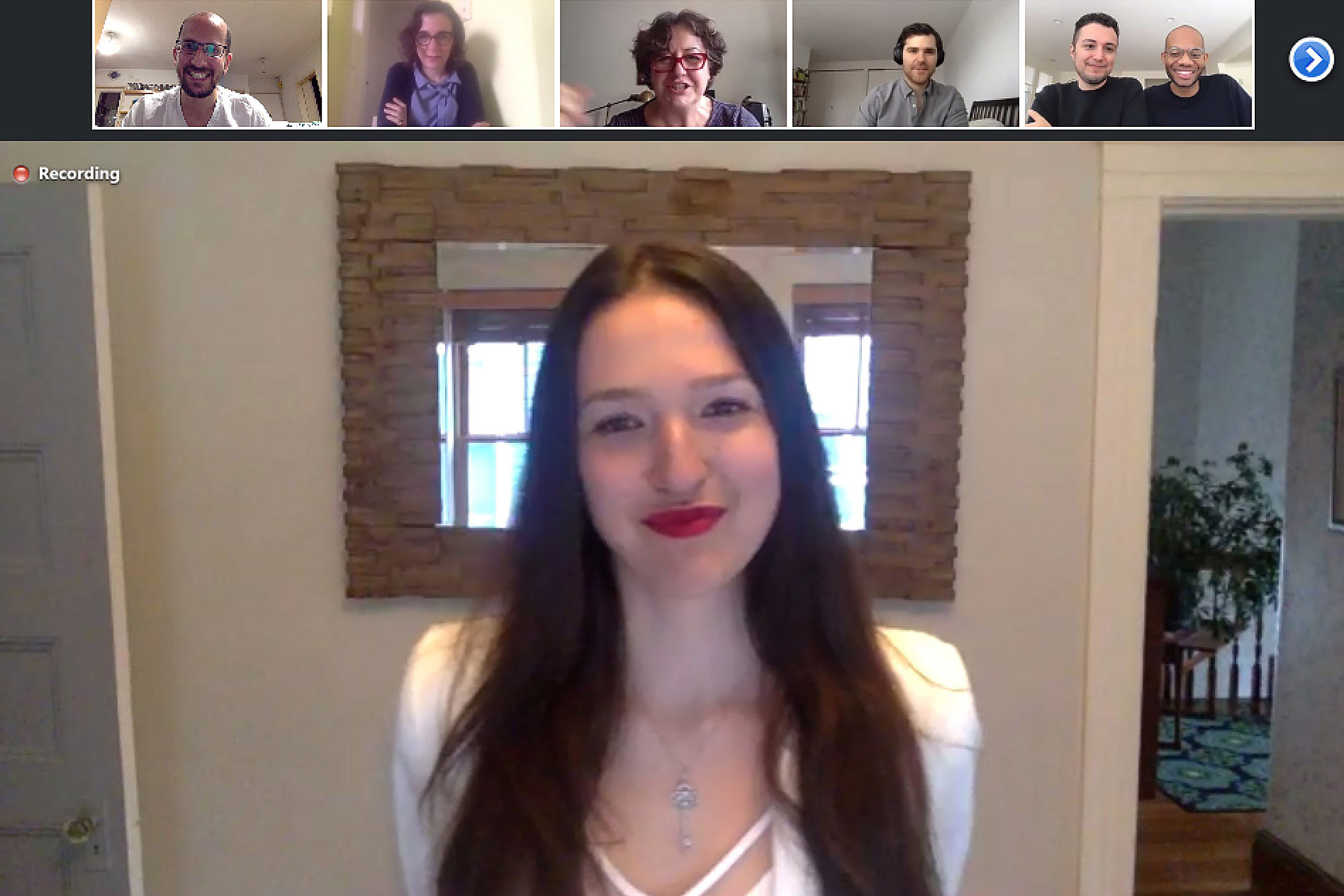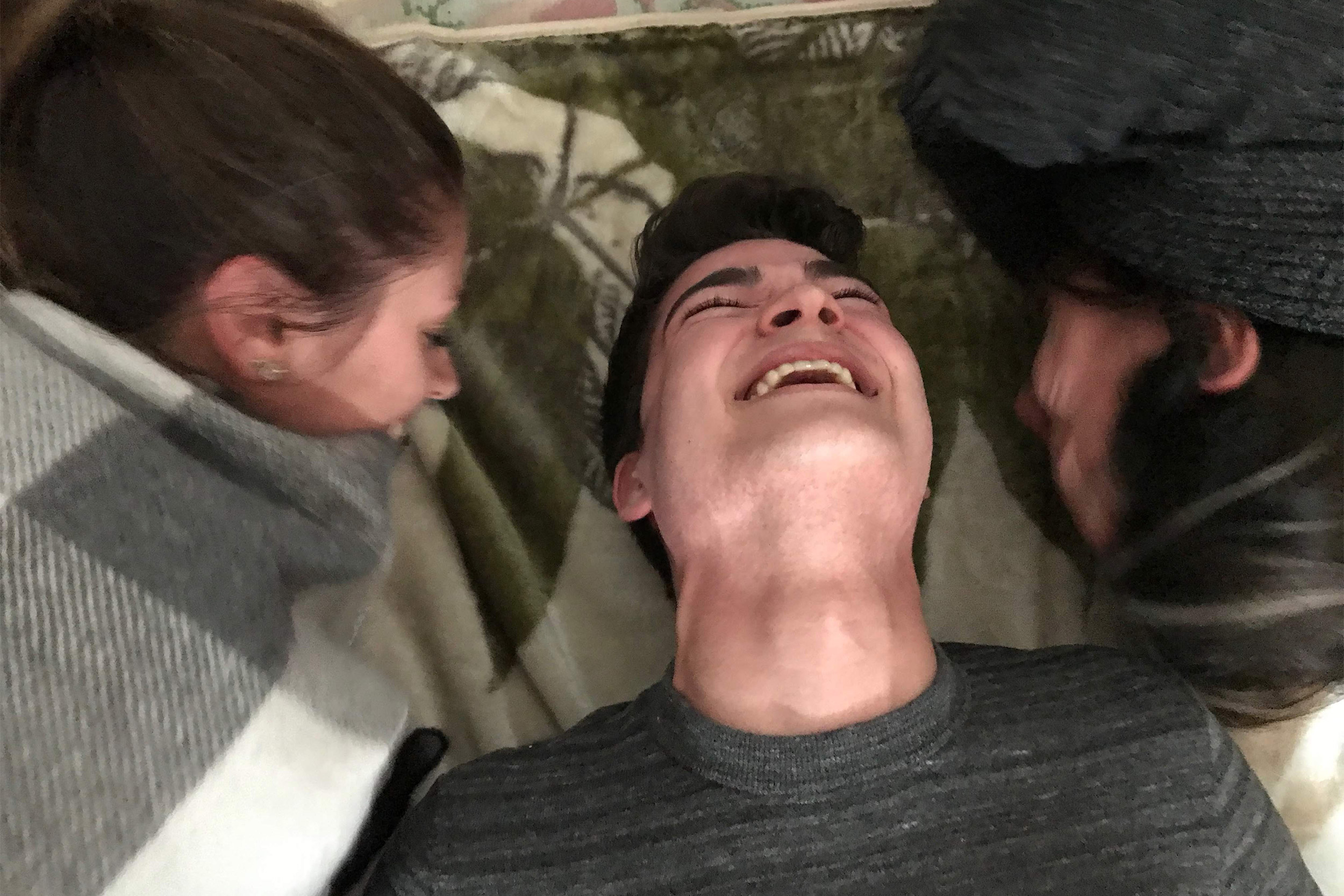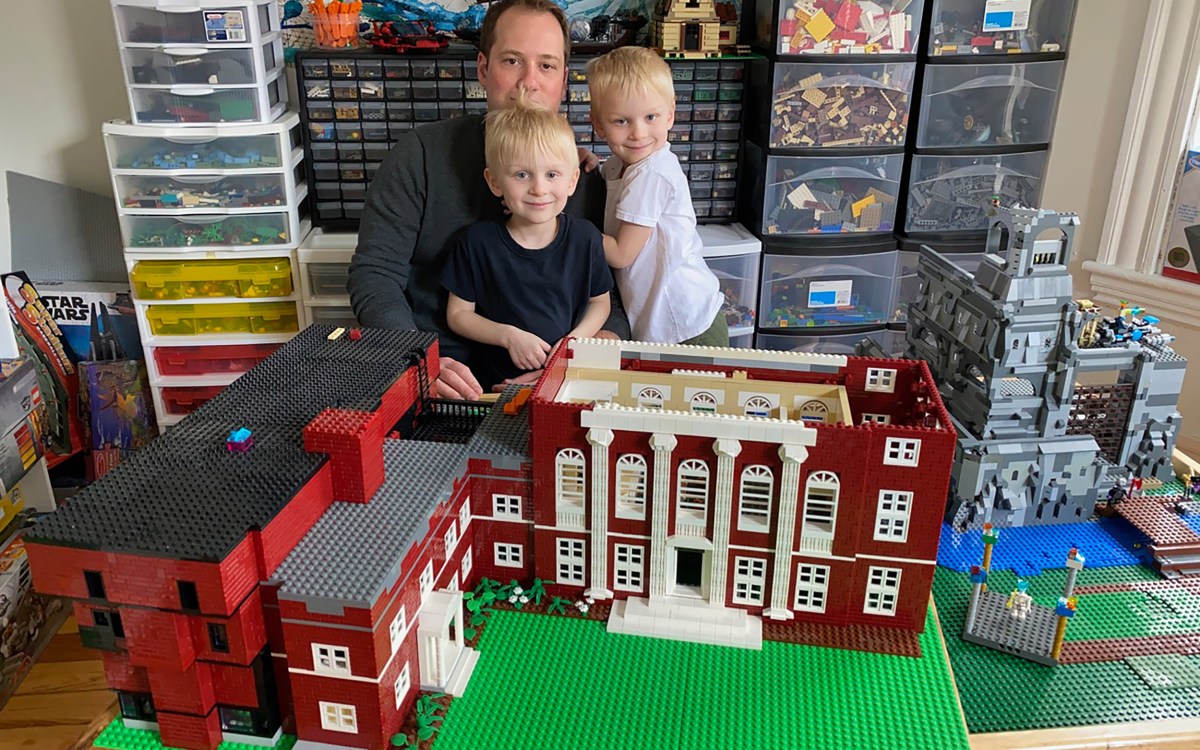
More than 70 people were “in attendance” to celebrate with Nina Gheihman, who defended her doctoral dissertation via Zoom.
Courtesy of Nina Gheihman
Dispatches from socially distancing students and faculty
A remote ‘Doctor of Philosophy Dance Party,’ laughter yoga, crowd-sourced altruism, and tweet to remember
Nina Gheihman virtually gathered more than 70 friends and family for a monumental life event on the first Friday of April. She wore white, and champagne and dancing were involved.
Gheihman was defending her doctoral dissertation in sociology, “Veganized: How Cultural Entrepreneurs Mainstreamed a Movement.” The white outfit was a pantsuit chosen as a symbol of solidarity with trailblazing women in her field and beyond. Her guests included her three-member dissertation committee.
“It was all the people who are important to me in my life, and I was wearing white, but it’s not my wedding,” Gheihman joked.
After the panel unanimously approved her work, Gheihman had a smaller online celebration with friends, drinking champagne and having a “Doctor of Philosophy Dance Party” with a playlist featuring ABBA and James Brown.
Her outfit, inspired by the one New York Rep. Alexandria Ocasio-Cortez wore at her 2019 swearing-in ceremony, was the only holdover from her original plans for defending her dissertation and graduating from her doctoral program.
“Of course, I was disappointed at first,” she said of scrapping her plans, which included a vegan celebration dinner at Oleana in Cambridge, a trip to New York to meet with publishers about a book proposal based on her dissertation, and a meditation retreat.
But a defense in the days of social distancing also opened possibilities.
“I just decided that this was an opportunity to invite a lot of people who have been part of the research as part of the dissertation defense,” she said. “Normally I would have invited 30 people in person, but [because it was being done remotely] I was able to invite many more people who would not have been able to be there otherwise. It was a really great experience, honestly.”
“I’ve never done a dissertation defense where you have [so many] people online, and it was amazing in the sense that technology has enabled something that we would never have been able to do a few years ago,” said Michèle Lamont, Gheihman’s adviser and professor of sociology and African and African American studies, Robert I. Goldman Professor of European Studies, and director of the Weatherhead Center for International Affairs.
Besides it being online, much of the defense proceeded as if in person. A major part of it involved Gheihman presenting her work to her committee. To help her practice she enlisted her sister, Galina Gheihman, M.D. ’19, and her best friend, Lauren Valentino, an incoming Ohio State University sociology professor, to watch and give her feedback over Zoom.
Taking questions from the audience, a typical part of the event, wouldn’t be possible. But Gheihman was intent on ensuring that one important aspect would be: having committee members ceremonially leave the room to deliberate.
In the Harvard Sociology Department, “There is some pomp and circumstance where the committee leaves at the end, and it’s very dramatic,” she said. “In this case, I had to figure out how to use breakout rooms on Zoom and show my committee how to use it.”
On the day of the event, friends and family from her hometown of Toronto, around the East Coast, and from her fieldwork in the Middle East, Europe, and California joined the session to offer support, including a doctor friend working at a hospital in New York, who signed on wearing a mask and gloves.
“This crisis opens up opportunities that people would not have expected,” said Lamont. “It’s not that there are silver linings, but this is an experience we would not have been able to have otherwise.”
“When I saw everyone on video, it made me feel like I wasn’t alone,” said Gheihman. “It was just nice to be able to share the culmination of a seven-year journey with all these people who were a part of it in some way.”

Certified yoga instructor Kevin Ballen ’22 led a virtual laughter yoga class.
Courtesy of Kevin Ballen ’22
Just for laughs
Kevin Ballen ’22 knows the power of a (much-needed) mental-health break, social-distance style — and a good laugh. This past Saturday, he led a virtual laughter yoga class.
Ballen, who is a certified instructor, described the simple concept this way: Just laugh. There are no special skills needed, no equipment, and, most important, nothing needs to be funny.
“Laughter yoga is basically the practice of laughing for no reason. The basic idea behind it is that laughter is just really good for you,” he said. “It releases serotonin, dopamine, and endorphins in your body and your brain. And it really doesn’t matter whether it’s fake laughter or real laughter.”
The virtual class was open to the entire Harvard community. It drew about 20 participants and featured a series of laughter-filled scenarios, stretches, and deep-breathing techniques. It is yoga, after all. The workshop is designed as a 45-minute personal health break at a time of heightened worry, anxiety, and fear.
“People are feeling down and depressed looking at the news,” Ballen said. “It’s a really difficult time in so many different respects, so hopefully laughter yoga can be just this spurt of joy, positivity, movement, and silliness at a time everything is serious.”
A different lesson
When David Deming invited students from his fall course Econ 1084, “The Causes and Consequences of Inequality,” to reconnect over spring break, the Harvard Kennedy School and Harvard Graduate School of Education professor didn’t anticipate the virtual reunion would turn into a real fundraiser.
Fifty students, a mix of undergrads and grad students, showed up on Zoom, and Deming shared some slides about the likely economic and social impacts of the virus. During the Q&A period, a student asked, “What could I do to help others during this difficult time?”
“The answer for most of us is to sit tight and wait for the front-line workers and public health experts to do their job. But everyone wants to make a difference. So I decided to donate to GiveDirectly, a nonprofit organization that wires money to recipients, many of whom are suffering right now,” said Deming, the director of the Malcolm Wiener Center for Social Policy. “It’s effective altruism, a scientific approach to charitable giving.”
He told students he would match their donations, and soon his inbox was full of receipts from more than 30 students who had given more than $1,800 altogether.
“I wasn’t coming into that class to cut such a big check, but I was overwhelmed by my students’ generosity and by the way that coming together helped us all share strength,” said Deming, who plans to hold more reunion classes related to the pandemic. “I told the students: ‘You are doing me a favor to apply my skills to make me feel like I’m making a difference too.’ That’s what’s so great about connecting with students. It made me feel so much better.”
Flash from the past
Joyce Chaplin, James Duncan Phillips Professor of History, had this Twitter reflection on how her recent past feels so distant:
https://twitter.com/JoyceChaplin1/status/1246170830020673536





